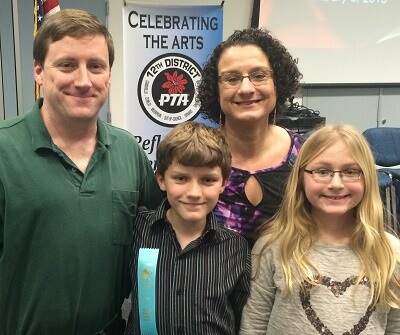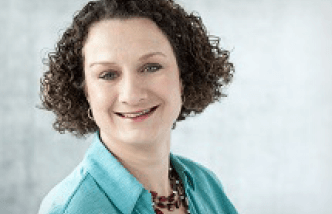Getting to Know the La Piana Team: An Interview with Kristen Godard
This blog post is part of our series getting to know the La Piana team. This week we spoke with Kristen Godard, Partner and Director of Finance & Operations. Kristen joined the firm in 2001 and is based in the Los Angeles area.
When and why did you decide to dedicate your career to the nonprofit sector?
I did my graduate work in environmental planning and policy, and was headed toward a public sector job — I even had a job offer lined up at a regional planning agency. But while in grad school, I was introduced to a national foundation working on environmental issues (everything ranging from toxics and pesticides to forests), and they had a fellowship program I became a part of. I was hired for a one-year position that ended up turning into full-time, so my first real job out of grad school was being a foundation program officer making grants to nonprofits. For six years, I traveled around the country working with mostly small environmental organizations, and I saw that many of the people running those groups hadn’t had management training and had knowledge gaps around nonprofit finance, board management, and those sorts of things. I had never worked as a nonprofit leader, either, but it got me thinking. So when that job ended and I was considering what to do next, I had already been looking at organizations that were working in the area of nonprofit effectiveness. I went to work at the Support Center for Nonprofit Management — which had just gone through a merger with the Nonprofit Development Center to form CompassPoint — where I was part of developing their program in San Jose. There, I was introduced to La Piana Consulting, where I’ve since continued to learn about deeper nonprofit capacity building.
How have your previous positions, both in and out of the nonprofit sector, shaped your work today?
As a program officer, I’d had a bird’s eye view of the issues facing small environmental nonprofits, and then working at CompassPoint was like a crash course on a whole range of organizational effectiveness topics. It taught me a lot. Now I’m one step removed from the consulting work in my management role at La Piana, and sometimes miss working directly with nonprofits and experiencing their work first-hand. But I get a high-level view of what’s happening with organizations through developing proposals with our team and from talking with my colleagues on an everyday basis, so I still get the benefit of knowing what’s going on in the sector because of that.
What do you find most rewarding about your work?
My undergraduate degree is in systems engineering, and I’ve been able to bring some of those systems-thinking skills (things like needs assessment and process optimization) to our operations as a consulting firm, which has been really cool. My role here is kind of interesting because on one hand, it’s all the operational, financial, internal work, but I’m also involved in managing our project cycles. One of the most important things I do is match consultants to projects, which means looking at what the client needs, what kind of organization they are, and knowing what each of our consultants brings and who would be the best fit. So I’m not directly involved in our project work with clients, but I do touch all pieces of it, from the proposal development process all the way to the final wrap-up and invoicing. It’s satisfying to see how the processes and systems we’ve designed pull all of this into a cohesive set of activities around our project cycle and our client relationships.
 Outside of work, what do you enjoy doing?
Outside of work, what do you enjoy doing?
I have kids (ages 9 and 11) so the past decade has been caught up in being a mom to two small kids. My extracurricular passion has always been music, theater, and performing arts — though always as a patron, not performer. And what’s great is that both my kids share that passion, but they are actually performers. So a lot of my spare time is spent helping with their performances, getting them to and from rehearsals, all of that. It’s a family bonding thing we all enjoy together. I volunteer pretty extensively in the things my kids are involved with, from Girl Scouts to chorus — and most deeply with the PTA. For the past four or five years, I’ve taken on a leadership role where I’ve been able to bring in a lot of my professional expertise in things like finance, communications, social media, and volunteer management. It’s really upped our game in terms of what we’re able to do as a PTA.
What is something that most people don’t know about you?
I’m not so sure I should divulge this, but I’ve been to 120 Phish shows, dating back to 1989 when they were just a bar band from Vermont. What can I say? I’m a music phan! From this passion, I was involved in helping my husband and a group of friends form the Mockingbird Foundation back in 1996. Mockingbird is an all-volunteer group of Phish fans that has raised close to a million dollars for music education, providing grants to schools and nonprofits all over the country. I served as the Foundation’s Grants Director for over 10 years, chairing a committee that reviews hundreds of funding inquiries annually.
What advice would you give someone considering a career in the nonprofit sector?
It’s hard to say because there are so many different roles, but I think that having a balance between understanding the issue you’re working on and knowing what goes into running an organization is really important. A lot of nonprofit leaders and advocates are there for the mission — and that’s great! — but to really be effective, all those management issues need to be taken into account, too.
Is there a particular book you’ve read, or a movie you’ve seen, that has really stuck with you?
I hate to be such a “mom” [laughing], but there’s actually a great parenting blog I follow called Hands Free Mama that’s recently had a big impact on how I think about my “free” time and how I balance my home and work life. Almost all of us at La Piana work remotely, and it’s great to have that flexibility — as a working parent, I really value it. But it also means I’m never really away from work! Smartphones mean that I don’t work a normal 9-to-5 because it’s so hard to turn it off. This blog has been interesting to read because the author has grappled with a lot of the same challenges and distractions. It’s pretty simple stuff, but her writing style is beautiful and quite touching — and it really speaks to what parents and families are facing in today’s 24/7 world.


Comment section